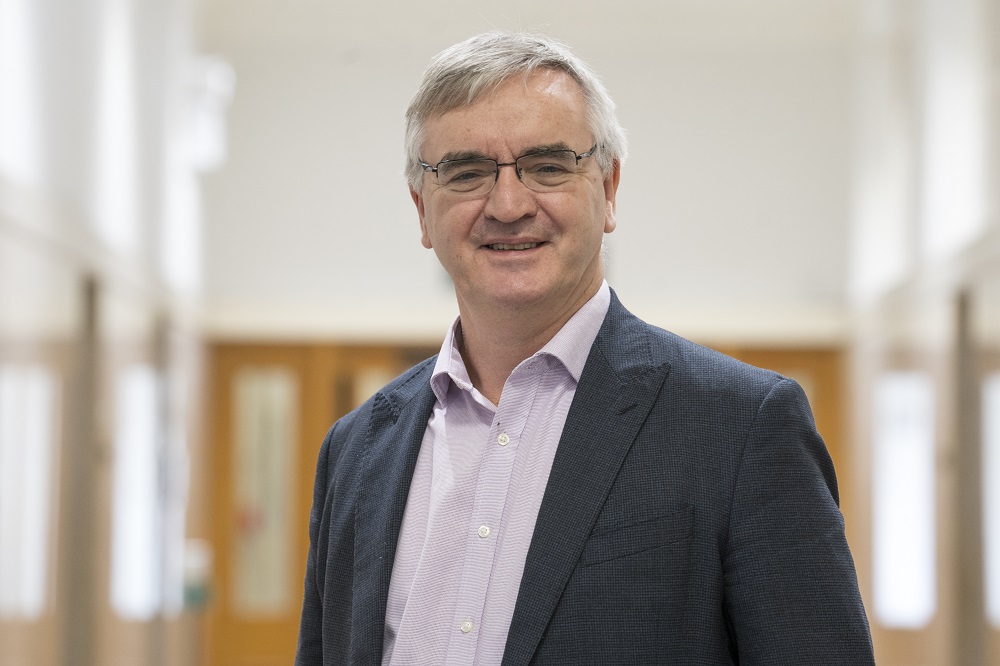
December 14, 2023, by Rob Ounsworth
Season’s greetings and a look ahead to 2024 in research
Welcome to my final research update for 2023. I have hugely enjoyed my first few months back at Nottingham. As deputy exec chair for the Engineering and Physical Sciences Research Council (EPSRC) and as a chief scientific adviser I enjoyed an overview of the research across the UK. In my first few months in this role, I have been hugely impressed by just how much excellent research we deliver at Nottingham. There is much to be proud of at our university.
I would like to share some highlights of the year and news of further support for researchers in 2024.
My sincere thanks to everyone in our research community for their dedication, hard work and goodwill in delivering the following achievements and thanks to Professor Sam Kingman, who as Interim Pro-Vice-Chancellor for Research and Knowledge Exchange provided the leadership to help the research community produce such fantastic research results.
I would like to highlight the energy and commitment of everyone in Research and Innovation. In 2023, while adjusting to R&I’s new structure and systems, and coping with UKRI’s own overhaul of funding systems, they have been instrumental in helping our research community deliver so much.
Research awards
Research and research-related awards were £209.2m for 2022-23, exceeding the target for the financial year and we’re on track for another excellent performance for 2023-24.
For 2023, significant awards include:
- more than £5m from East Midlands Freeport (match funded by Nottingham and Loughborough University), to support the first phase of a zero carbon innovation centre
- a share of £10m form the EU’s Clean Aviation Joint Undertaking, for several net zero projects led by the Institute of Aerospace Technology.
- Nottingham researchers are part of a consortium awarded £31m to create an international research and innovation ecosystem for responsible AI.
- Establishment of a £4m ovarian cancer research centre.
Back in Horizon Europe
A highlight of 2023 is the UK’s rejoining of Horizon Europe, the EU’s flagship scientific research programme, which allows scientists and researchers to apply for funding from the £81bn (€95bn) scheme.
Our funding successes, before and following September’s announcement, are due to our researchers continuing to engage with Europe and the diligence of professional services in helping to secure bids.
The latest such award sees Dr Nicolai Kraus, from the School of Computer Science, landing a €2m European Research Council consolidator grant to further explore an area in the intersection of computer science and mathematics.
Successes in 2023
Outstanding teams are behind all we achieve. There are too many to mention, but highlights include:
Research project of the year
Congratulations to Dr Barbara Morera and Professor Stephen Jackson, from the School of Psychology, the School of Medicine’s Professor Georgina Jackson and all the team who scooped the STEM Research Project of the Year at the Times Higher Education (THE) Awards. They have developed and commercialised a watch-like device that delivers rhythmic electrical pulses to the wearer’s wrist, with the aim of reducing the verbal and physical tics associated with Tourette’s.
Silver Engage Watermark
The university has been awarded a prestigious Silver Engage Watermark by the National Co-ordinating Centre for Public Engagement. The watermark recognises the university’s commitment to involving the public in its work and the sharing of knowledge, teaching and research.
Athena Swan Gold Award
Nottingham became the first university in the country to be awarded the coveted Athena Swan Gold Award for its commitment to advance gender equality across higher education and research.
Knowledge Exchange Framework
In Research England’s Knowledge Exchange Framework (KEF), Nottingham was again reaffirmed as one of England’s leading universities for working collaboratively with industry and the public sector and the commercialisation of Intellectual Property.
UKRI Future Leaders Fellowships
Dr Joanne Cormac, of the School of Humanities, and Dr Peter Harvey, of the School of Chemistry and School of Medicine, have each been awarded a UKRI Future Leaders Fellowship. These prestigious and highly competitive fellowships provide researchers with long-term support and training, giving them the freedom to explore adventurous new ideas, and to build dynamic careers that break down the boundaries between sectors and disciplines.
Looking ahead to 2024 and beyond
We wish to build upon our success in 2023 by rolling out several Initiatives in 2024 to support our research community. These will include:
Improving the researcher experience
Workshops held in November and December saw stakeholders capture key pain points of the research lifecycle and business improvement suggestions. From the new year, Research and Innovation will working with stakeholder groups to develop these into action plans to improve communications, streamline processes and provide better guidance across the research lifecycle. This builds on the work under way to improve the award set-up process and remove delays in getting projects coded.
Faculty-based Innovation Hubs
Faculty-based Innovation Hubs, focused on supporting engagement in all areas of knowledge exchange, will be rolled out. The hubs, initially in the faculties of Science and Engineering, aim to create a seamless engagement between faculties and Research and Innovation, increasing economic and societal impact, and growing income and reputation for the university.
Complex bids toolkit
Research and Innovation is creating a complex bids toolkit which will be an open resource for anyone putting together larger or more complicated applications for funding. We hope to launch this in early 2024.
Digital research
Digital and Technology Services will launch the university’s new high-performance computer in early 2024. This will provide a significant uplift in the university’s research computing capacity and includes dedicated specialists to help colleagues make use of the service.
The Digital Research Service is delivering a platform (TRE-FX) that will allow federated analytical tools to interact with Trusted Research Environments, Secure Data Environments, and Secure Processing Environments.
Libraries and research
Researchers funded by UKRI must ensure that publishing contracts they sign from 1 January 2024 support open access in line with new long-form requirements of UKRI open access policy. University of Nottingham Libraries Research Support team are ready to support affected researchers with complying with the new requirements.
New Research Intelligence Service from libraries
A new Research Intelligence service from University of Nottingham Libraries is now available for all researchers and research-enabling staff.
The service will support researchers to build peer reputation and raise awareness of their work. Using scholarly literature, patents, global policy documents, citation data and alternative metrics the service will help researchers to:
- discover suitable collaborators and benchmark against other research groups
- use impact data to strengthen funding bids
- develop publication strategies
- enhance external and internal academic profiles to increase visibility of research
- evidence research traction and tell the story of how research has been applied
Research Leadership Programmes
The Researcher Academy’s Research Leadership Programmes are open for applications, with deadline of 16 February 2024.
The Nottingham Research Leaders Programme is aimed at high-performing researchers at level 6/7 who seek to develop their careers, and help mentor, support and inspire colleagues so as to deliver internationally recognised and outstanding research activities. The programme offers tailored training and one-on-one coaching to achieve these goals.
The ECR Leadership Programme is for early career researchers (2-8 years post-PhD) from all faculties. It is aimed at building the capabilities of young researchers in self-leadership and high performance.
The Research Leadership Accelerator Programme will be launched in January 2024 to harness the leadership potential of mid-career researchers.
The Researcher Academy will host a Q&A session on applying for the programmes in Mid-January. Please indicate if you would like to attend this event by completing this form
For any enquiries, please contact Amanda Chukwudozie or Jasmine Rakhra
UniCore: minimising the impact on your research
Rollout of the university’s new HR, Finance and Procurement system (UniCore) takes place during mid-May 2024.
Inevitably, there will be some disruption and project teams are working hard to mitigate this for our research community, including managing access to RIS and Agresso. The ‘Preparing for UniCore’ webpage provides an understanding of the processes that will be affected during the cutover period.
It is worth reflecting now on the potential impact this will have on you research as a range of services will not be available during the cutover period. Please read through the details on the ‘Preparing for UniCore’ webpage and think how it might impact your research and how you might mitigate this through replanning some parts of your research programme. As details become clearer, we will provide more advice on how best to minimise the impact.
To minimise the impact on your research:
- work closely with your faculty/school teams who will also provide guidance
- book travel and make purchased in advance of the April deadlines where possible
- consider project and other dates and try to avoid April/May
- flag any known critical activities during this cutover period to your local support teams in advance
- for fieldwork, conferences etc during this time complete bookings in advance.
REF2029
Finally, the next Research Excellence Framework has been delayed from 2028 to 2029, in response to concerns from the sector on the size of the proposed changes and to give institutions and assessors more time to prepare.
We do know that REF will still assess research outputs and impact but have greater emphasise on research environment and culture. How do you measure research culture? There’s no easy answer but I will work with Katherine Linehan, Pro-Vice-Chancellor for EDI, People and Culture, to ensure that a supportive, inclusive culture for research is at the core of all we do.
As we consult with Research England and await further guidance on use of data, and impact case study and submission requirements, we will discuss with faculty Pro-Vice-Chancellors our preparations on how best to position and articulate the high-quality research that we deliver.
With sincere thanks for your support during 2023 and best wishes for a restful winter break,
Professor Tom Rodden
Pro-Vice-Chancellor for Research and Knowledge Exchange
No comments yet, fill out a comment to be the first


Leave a Reply